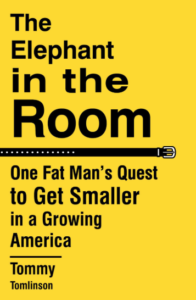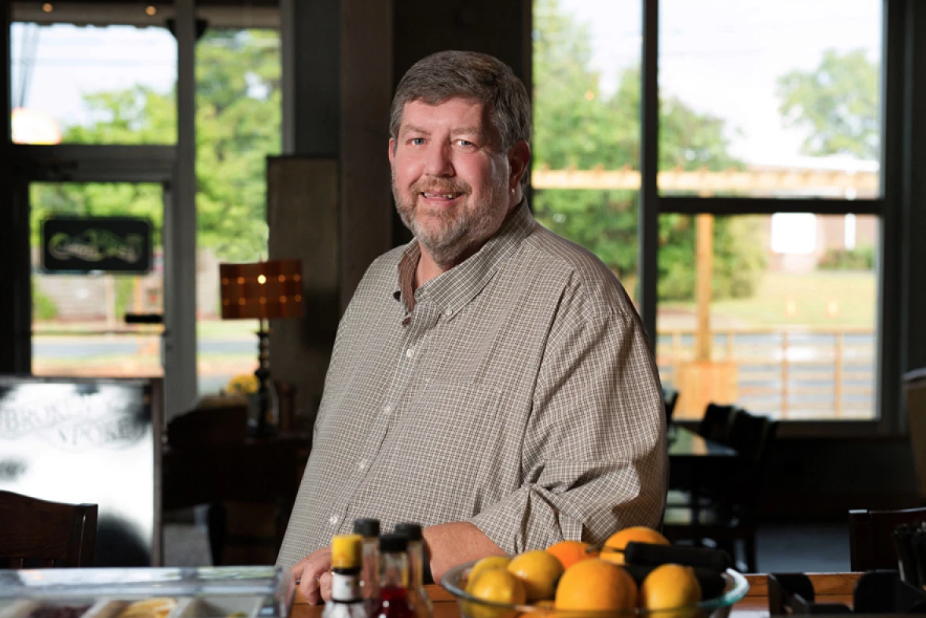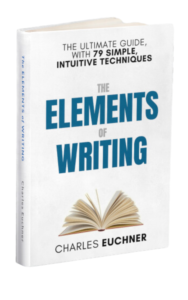This is the first part of a two-part interview with the longtime columnist, author, and podcaster Tommy Tomlinson. You can find Part 2 here.
The challenge of philosophy, the ancient thinkers said, is to “know thyself.” But as he turned 50 in 2015, Tommy Tomlinson struggled with a different, more difficult question: How did I get this way?
 Happily married and surrounded by friends, he struggled silently with the problem now pandemic in America. He was obese—morbidly obese, in fact—and in danger of keeling over from a heart attack at any time.
Happily married and surrounded by friends, he struggled silently with the problem now pandemic in America. He was obese—morbidly obese, in fact—and in danger of keeling over from a heart attack at any time.
On the day of setting resolutions, New Year’s Eve of 2014, Tomlinson weighed 460 pounds. People rarely talked about it, but his obesity spoiled every aspect of his life. He was a success as a journalist, a popular columnist for the Charlotte Observer who also wrote for national publications like ESPN the Magazine. Despite his success, he had to think about his weight wherever he went. Before meeting people for a meal, he had to scope out the restaurant ahead of time. He had to think about the ordeal of climbing stairs. He had to strategize every element of his otherwise satisfying life. Life was one compensation after another.
Like tens of millions of other Americans, Tomlinson had tried lots of diets and tried to burn calories on the street or in the gym. But if he dropped 10 pounds, he gained them all back—sometimes more.
had tried lots of diets and tried to burn calories on the street or in the gym. But if he dropped 10 pounds, he gained them all back—sometimes more.
When he told his literary agent about scoping out the restaurant where they met, the agent knew Tomlinson had to tell his story. The result is the tragicomedy of a memoir, The Elephant in the Room. That book is not just Tomlinson’s story. It’s his answer to the great question: How did I get this way?
It’s complicated. The child of working class Georgians, Tomlinson grew up in a culture defined by family reunions, snacking during commutes, college parties, and drive-thru windows—and by barbeque, fried chicken, burgers, cakes, chips, beers, and deep-fried everything. Food was everywhere, a constant delight but also numbing, a matter of compulsion as much as desire.
It’s a story of triumph but also, sometimes, failure. This battle is not won easily. So how’s Tommy Tomlinson doing now? Not bad, he says: “I’m doing fine on weight … lost about 100 pounds, hurt my back, gained a little back, but am headed back down the scale again.”
The Elephant in the Room, recently reissued in paperback, has earned raves. Curtis Sittenfeld says it’s “warm and funny and honest and painful and poignant.” The New York Times praised Tomlinson’s “clean and witty and punchy sentences, his smarts and his middle-class sensibility.” Kirkus Reviews says: “He doesn’t hold back in his comments about his needs and wants and interjects enough humor to offset the more serious parts of the narrative and keep the pages turning.”
I am as impressed by Tommy Tomlinson’s writing soigne as by his bravery in confronting such a hard question. So I decided to seek him out. An edited transcript of our conversation:
You’ve gotten an amazing response for this book. How does it feel? Emotionally, it’s a risky book. You’re jumping off a cliff.
I’ve been incredibly grateful for all the response from writers I admire and strangers as well. I’ve probably gotten a couple thousands emails and just recently I got a five-page handwritten letter from Austria. What was especially gratifying about that letter is that this guy was not dealing with weight issues. He had other issues like depression and he saw parallels. That’s exactly what I was hoping for, that people would see themselves in the story.
That’s the definition of good writing. The more specific you get, the more universal. Only when people see and feel something do they have empathy for that other person.
I heard a podcast interview with the songwriter Mary Gautier. She has done cowriting with veterans and spouses of veterans. How did she get them to tell their stories? She said there’s the generic story, there’s the personal story, and below that there’s the deeply personal story. The deeply personal story is universal.
The details of the story might not be universal, but the subtext can relate to anybody. And that’s what I was shooting for.
What gets at the deepest level? Is it just going into increasing discomfort? I like to think of writing as pointillism, so is it adding more dots? What is the difference between going deep and going really deep?
Sure, making yourself uncomfortable helps. But to me it’s the details that matter. I thought about which details would illustrate the points I want to make, which ones provide a subtext and a larger meaning. The right details make it powerful.
That’s the sorting that I did. I started with a lot of stories I could have told. Then I narrowed it to the ones that carried the most symbolic or metaphorical weight.
Why did you write this book? I’m sure it involved a lot of pros and cons. What if people read it the wrong way? Do you want to expose yourself? What it it lands like a thud? So what was your process for deciding to write this book?
You’re describing my thoughts pretty closely. The topic came to me in 2011. I met my agent in New York and he asked the usual question: “What are you thinking about lately?” I told him that I had Googled the interior of that restaurant the night before to make sure there was a comfortable place to sit. I made sure I got there early and scanned the place like a gangster and figured out what would be the safest place to sit. I lived my whole life that way, like an obstacle course.
I had a wife I loved and people who cared for me but I was miserable a lot of the time because I could not solve this one puzzle. He said: “Well, dude that’s the book.” I knew right away he was right but I was afraid of it, what I would have to reveal about myself and how it would affect the people I cared about.
Years later [in 2014] I was working for ESPN the Magazine and started working on a story about Jared Lorenzen, the biggest quarterback anyone had ever seen. He played in the NFL for a while, now he was playing minor league football in Lexington, Kentucky, and he was 400 pounds. I went to Kentucky and we talked about all the things that had been in my head and weighed on me all these years. It was really cathartic for me. As I finished that story, I realized I could see a way to doing mine.
When people do memoirs, the writing process is a process of discovery. Only when they put their fingers on the keyboard did they realize that they thought this or remembered that.
When I started, I didn’t have much of a clue about why I got so big in the first place. What about my early life contributed? As I worked on the book, I saw connections and started to have feelings and insights that I had not had before. It caused me to be self-reflective in a way that I hadn’t been before. I had been reflective about other people’s lives, but I failed to hold myself to the same standard.
We all have issues about weight or drinking or the way we were raised or relationships. We tend to deal with it in a fleeting way. But writing a book, you have to go deep.
After the book was done, someone asked about my writing routine. My wife said, “I could tell your writing routine: You would get up, have breakfast, write for three or four hours, come out of the office, and sleep for two hours. You were so emotionally drained.” It was true. It was exhausting to dig into that stuff in a deep way and confront things I had only done in a fleeting, shallow way before.
What people did you interview to fill in the blanks of the story?
I sent questionnaires to 30 people, saying, “When you think about me, what do you think about? Do you think about my weight? When I’m not around and my name comes up, what do people say?” I discovered that my friends were really worried about me. They asked, “Is there something we can do” and “What’s going to happen when he’s not around?”
I did deeper interviews with my wife and my mom—long sit-down interviews that we recorded. Those thoughts informed everything. We had never just sat down and talked about this stuff in that way. They were uncomfortable conversations. If I published nothing, they would still be useful to me. And I thought they would be useful for other people trying to understand their own issues.
It’s almost like arranging your own intervention. And it’s a way of coming together with friends and family in a new way.
I never thought about it being an intervention, but that’s actually pretty accurate. My friends said we want to get you help but didn’t know how to do it. It was a wakeup call for me and a new insight about how they saw me from the outside.
Was there anything that totally blew you away—something you never thought about before?
My mom told me she and my dad would lie in my bed and try to figure out how to deal with me and my weight. Should they yell? Take me to doctors? Get me out of the house more? Intellectually I knew they had to have had these conversations. Just the image of them lying there sleepless—that hit me really hard. Seeing that movie in my mind was devastating.
For the reader, that’s something that brings empathy because they can imagine—and they’ve been part of—conversations just like that.


